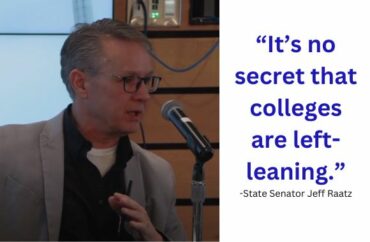
Says post-tenure review gives the law ‘teeth’
An Indiana law requiring “intellectual diversity” in higher education has raised free speech concerns, but one of its authors says it is meant to encourage “free thinkers.”
Republican State Sen. Jeff Raatz spoke to The College Fix about Senate Bill 202, a sweeping education bill signed into law last month. One portion of the law threatens tenure and promotion for professors who fail to allow “free inquiry, free expression, and intellectual diversity” in classrooms.
In a phone interview, Raatz (pictured) said the “concept” of the law is that “whoever’s in a classroom should be teaching.” He and two other Republicans wrote it because professors are “not there to indoctrinate people,” he said.
Senate Bill 202, which takes effect in July, directs university trustees to form standards for intellectual diversity and free expression and review instructors’ tenure every five years.
Universities may not revoke a professor’s tenure for their “public commentary,” “criticizing the institution’s leadership,” or “political activity conducted outside the faculty member’s teaching or mentoring duties,” the law reads.
For college students, “Having the opportunity to look at both sides of an issue is important,” Sent. Raatz told The Fix. “So, that’s kind of the beginning and end for me.”
Groups including the Foundation for Individual Rights and Expression maintain that the law could unfairly silence faculty while praising its intent.
“Intellectual diversity within institutions is desirable and helps create a true ‘marketplace of ideas’ at our colleges and universities,” FIRE Lead Counsel Tyler Coward said in an email to The Fix. “However, SB 202 goes too far into regulating academic instruction and contains vague standards for faculty evaluation that administrators or departments could too easily abuse.”
“Promoting intellectual diversity within academia requires nuance and care from faculty members, not top-down vague mandates from the government,” Coward told The Fix.
Coward pointed to a February blog post from FIRE that elaborates on these concerns:
Must a professor teaching the Austrian school of economics also teach communist alternatives? Must an American history professor who criticizes the 1619 Project in class also assign readings favorable to the 1619 Project? … What if a biology professor penned an op-ed in the student newspaper criticizing a presidential candidate during election season? Under this [law], would that professor face sanctions for subjecting ‘students to political or ideological views and opinions that are unrelated to the faculty member’s academic discipline?’
“FIRE’s initial concerns laid out in our blog post about the bill remain, as the legislature did not amend the bill after our writing,” Coward told The Fix.
Raatz pushed for bills to help Indiana higher education
Raatz said hearing from concerned Indiana parents and students inspired his push for diversity of thought in education. He noted Indiana’s low college enrollment rates and suggested intellectual diversity could make college more inviting.
“It’s no secret that colleges are left-leaning,” according to Raatz. “I think everybody knows that. Some are okay with it, some aren’t.” Raatz said investigating biased curriculum at the K-12 level and in higher education made him want to “do something about it.”
However, the American Association of University Professors believes there will be new challenges in hiring and retaining faculty. Robert Eno, an executive committee member of the Indiana University-Bloomington chapter, told The Fix this is the “general consensus” among chapter members.
“Our chapter members have a broad range of perspectives on intellectual diversity on campus,” Eno stated. “[H]owever, there is general consensus that the new law as drafted could stifle elements of academic freedom and has placed Indiana public universities at a major disadvantage in recruiting and retaining outstanding faculty.
The Fix asked Eno if there is a lack of intellectual diversity on campus and, if so, if the AAUP has other ideas on how to solve it.
The official position of the AAUP’s Ohio branch is that there is enough intellectual diversity at the Buckeye State’s public universities.
A February statement from Eno’s chapter and one at Purdue University said AAUP “shares” the goal of empowering students to “express their political and intellectual views freely.” But “SB 202 mandates a system of surveillance and political scrutiny that will instead stifle the free flow of ideas,” the statement reads.
“It requires that hiring, tenure, and promotion become subject to reviews that judge faculty based on political criteria, and that post-tenure employment be contingent on further periodic reviews,” the AAUP said.
“The security imparted by tenure is the fundamental protection of academic freedom; its loss would make university positions in Indiana undesirable,” according to the statement.
To Raatz, the review of tenure is precisely what gives the law “teeth.” He emphasized that he isn’t “100 percent [certain] how effective this bill will be,” but thinks it is “balanced enough that we could see some results.”
“From a legislative standpoint, we look at things and see how they pan out and, you know, wait to see what constituents have to say, their experiences with these institutions as well,” the lawmaker said.
“We’ll see how it plays out, out there, and go from there,” Raatz told The Fix.
MORE: Academics pledge ‘unwavering solidarity with Palestinian resistance’
IMAGE: WCTV/YouTube; College Fix edits
Like The College Fix on Facebook / Follow us on Twitter





Please join the conversation about our stories on Facebook, Twitter, Instagram, Reddit, MeWe, Rumble, Gab, Minds and Gettr.